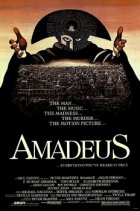
Amadeus Page #35
MOZART:
Thank you! Oh, thank you.
He kisses Salieri's hand.
SALIERI:
(withdrawing it;
imitating the Emperor)
No, no, no, Herr Mozart, please.
It's not a holy relic.
Mozart giggles with relief and gratitude.
INT. OLD SALIERI'S HOSPITAL ROOM - NIGHT - 1823
OLD SALIERI:
I'm sure I don't need to tell you I
said nothing whatever to the Emperor.
I went to the theatre ready to tell
Mozart that His Majesty had flown
into a rage when I mentioned the
ballet, when suddenly, to my
astonishment, in the middle of the
third act, the Emperor - who never
attended rehearsals - suddenly
appeared.
INT. OPERA HOUSE - DAY - 1780'S
In the background the same recitativo before the March. The
Emperor steals in surreptitiously with Von Strack, his finger
to his lips. He motions everyone not to rise, and slips into
a chair behind Salieri, Orsini-Rosenberg and Bonno.
The three conspirators look at each other wide-eyed.
The recitativo summons up the march, but instead there is
silence. Mozart lays down his baton. The musicians lay down
their instruments. The celebrants of Figaro's wedding come
in with a few pitiful dance steps, in procession, only to
come presently to a halt, lacking their music. The singers
try to go on singing, but they have no cues from their
conductor or from the accompaniment. Everyone on stage looks
lost, though they attempt to go on with the story for a while.
Consternation grows on the faces of the conspirators. Mozart
glances back at the group seated in the theatre. Finally,
the Emperor speaks, in a whisper.
JOSEPH:
What is this? I don't understand.
Is it modern?
BONNO:
Majesty, the Herr Director, he has
removed a balleto that would have
occurred at this place.
JOSEPH:
Why?
ORSINI-ROSENBERG
It is your regulation, Sire. No ballet
in your opera.
Mozart strains to hear what they are saying but cannot.
JOSEPH:
Do you like this, Salieri?
SALIERI:
It is not a question of liking, Your
Majesty. Your own law decrees it,
I'm afraid.
JOSEPH:
Well, look at them.
We do look at them. The spectacle on stage has now ground to
a complete halt.
JOSEPH:
No, no, no! This is nonsense. Let me
hear the scene with the music.
ORSINI-ROSENBERG
But, Sire -
JOSEPH:
Oblige me.
Orsini-Rosenberg acknowledges his defeat.
ORSINI-ROSENBERG
Yes, Majesty.
Orsini-Rosenberg rises and goes down to where Mozart sits
anxiously with the musicians, watching his approach.
ORSINI-ROSENBERG
Can we see the scene with the music
back, please?
MOZART:
Oh yes, certainly. Certainly, Herr
Director!
He looks back deliriously at Salieri, trying to indicate his
gratitude. Salieri acknowledges with a slight and subtle
nod.
Orsini-Rosenberg returns to his king.
MOZART:
Ladies and gentlemen, we're going
from where we stopped. The Count:
Anches so. Right away, please!
The singers scatter offstage to begin the scene again.
JOSEPH:
(to Orsini-Rosenberg)
What I hoped by that edict, Director,
was simply to prevent hours of dancing
like in French opera. There it is
endless, as you know.
ORSINI-ROSENBERG
Quite so, Majesty.
CUT BACK TO Mozart at the forte-piano, raising his hands.
The musicians raise their bows. With a flourish the happy
composer begins a reprise of the scene which had been cut
out. The music of the march begins faintly; the celebrants
of Figaro's wedding start to enter as the Count and the
Countess sit in their chairs.
In the theatre we see increasing pleasure on the Emperor's
face, sullenness and defeat on the courtiers'. Then, suddenly,
without interruption, on a crescendo repeat of the march, we
CUT TO:
INT. OPERA HOUSE - NIGHT - 1780'S
The theatre is brilliantly lit for the first public
performance of Figaro. Everybody is there: the Emperor, Von
Strack, Bonno Orsini-Rosenberg, Von Swieten, even Madame
Weber and her daughters in a box. The musicians all wear
imperial livery; the actors on stage are now in costume.
Mozart, conducting, wears his Order of the Golden Spur. The
company wheels in and around to the music of the restored
march, which reaches a triumphant climax.
CUT TO:
INT. OLD SALIERI'S HOSPITAL ROOM - NIGHT - 1823
OLD SALIERI:
(to Vogler)
So Figaro was produced in spite of
me. And in spite of me, a wonder was
revealed. One of the true wonders of
art. The restored third act was bold
and brilliant. The fourth was a
miracle.
Translation
Translate and read this script in other languages:
Select another language:
- - Select -
- 简体中文 (Chinese - Simplified)
- 繁體中文 (Chinese - Traditional)
- Español (Spanish)
- Esperanto (Esperanto)
- 日本語 (Japanese)
- Português (Portuguese)
- Deutsch (German)
- العربية (Arabic)
- Français (French)
- Русский (Russian)
- ಕನ್ನಡ (Kannada)
- 한국어 (Korean)
- עברית (Hebrew)
- Gaeilge (Irish)
- Українська (Ukrainian)
- اردو (Urdu)
- Magyar (Hungarian)
- मानक हिन्दी (Hindi)
- Indonesia (Indonesian)
- Italiano (Italian)
- தமிழ் (Tamil)
- Türkçe (Turkish)
- తెలుగు (Telugu)
- ภาษาไทย (Thai)
- Tiếng Việt (Vietnamese)
- Čeština (Czech)
- Polski (Polish)
- Bahasa Indonesia (Indonesian)
- Românește (Romanian)
- Nederlands (Dutch)
- Ελληνικά (Greek)
- Latinum (Latin)
- Svenska (Swedish)
- Dansk (Danish)
- Suomi (Finnish)
- فارسی (Persian)
- ייִדיש (Yiddish)
- հայերեն (Armenian)
- Norsk (Norwegian)
- English (English)
Citation
Use the citation below to add this screenplay to your bibliography:
Style:MLAChicagoAPA
"Amadeus" Scripts.com. STANDS4 LLC, 2025. Web. 11 Jan. 2025. <https://www.scripts.com/script/amadeus_352>.



Discuss this script with the community:
Report Comment
We're doing our best to make sure our content is useful, accurate and safe.
If by any chance you spot an inappropriate comment while navigating through our website please use this form to let us know, and we'll take care of it shortly.
Attachment
You need to be logged in to favorite.
Log In